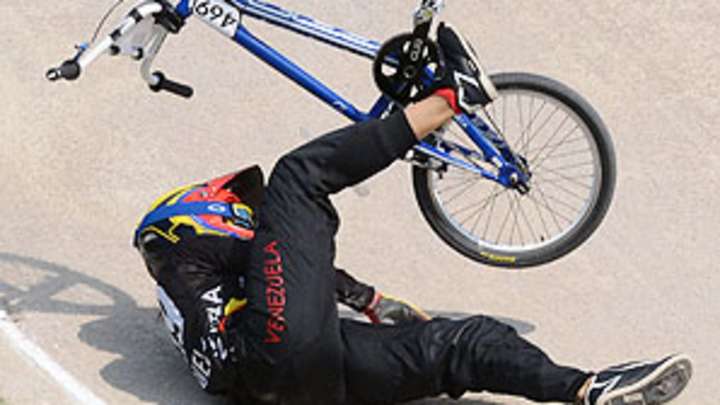Much to the delight of IOC, BMX features plenty of thrills and spills

LONDON -- I'll tell you straight up, I was in the stands at the Velopark for 14 BMX races today, a dozen semifinal heats and two finals, but only had my eye on the finish line for half of them. Maybe fewer.
That's because I was too busy scanning the track to see how many people had biffed, wiped out, stacked, endo-ed and otherwise come in violent contact with the dirt -- and how many of those riders would be able to leave under their own power. Two couldn't.
Which is another way of saying that the IOC grandees who conferred Olympic status on BMX before the Beijing Games have succeeded beyond their wildest dreams. In BMX, eight racers on tiny clown bikes speed down a fairly monstrous ramp, then negotiate an array of banked turns and jumps and whoop sections on a track designed to accommodate half that number. The athletes are incredibly skilled and fit and beyond courageous, which is a good thing, because crashes are guaranteed: there were five wipeouts in the first five heats on Friday. Brazilian rider Squel Stein was carted off the course on a stretcher. ("She can move her arms and legs and can speak," a Brazilian spokesman told the AP a few hours later).
Today's gold medalists were Maris (The Machine) Strombergs, of Latvia, who successfully defended his gold from Beijing, and a 20-year-old Colombian spitfire named Mariana Pajon, who's been racing BMX since she was 4, won a world championship at the age of 8, and quit gymnastics when it became apparent that she had a better chance of competing in an Olympics on a bicycle.
But the real star was the carnage, precisely as the IOC intended. The event moves along quickly -- heats take less than a minute -- and usually feature a pileup or two. "It's an adrenaline-packed sport," explained silver medalist Sam Willoughby of Australia. "It's appealing to a younger generation, it doesn't take a very big attention span, and it's exciting."
It's TV friendly, in other words, unlike the decathlon, which drags on over two days, and whose 10 events offer no real opportunity for carnage, unless some javelin goes badly off course. Come to think of it, why do we even have an Olympic decathlon?
Team USA's top hope for a BMX medal, Connor Fields, qualified first for the finals after winning two of his three semifinal heats. In the heat he didn't win, he was taken down by a French rider who "went a little too low in the corner," recalled Fields, a 19-year-old from Las Vegas. "Because it's the Olympics, everyone was riding over their head, going for stuff they wouldn't normally go for. He was overaggressive and crashed right in front of me."
Breaking his fall, he tore a large patch of skin off his left palm, which looked like raw hamburger after the race. Despite drawing the "pole position" in the final, he got off to a lousy start and was never in the mix for a medal.
You've got to be good in BMX, but you've also got to be lucky. "It's not like swimming or track and field where the fastest guy is gonna win because he's the fastest guy," says Fields. "That's just BMX."
That reminded me of what British track cyclist Ed Clancy had said about the omnium, whose three "mass start" events leave riders open to the vagaries of chance and ill luck and boneheaded moves by other riders. "It's great entertainment," said Clancy, "but whether it fits in with the whole higher, faster, stronger ethos of the Olympics, I don't know."
Clearly, it's time to change the slogan, possibly to "citius, altius, luckiest."
Before the start of each heat, the crowd is instructed (rather annoyingly) to shush by British actors on the giant video screen. When the gate drops, the roar of the crowd seemed to contain, to me, at least a hint of bloodlust -- like the noise the gladiators once heard in the Roman Coliseum. Team USA's Alise Post, of St. Cloud, Minn., appeared to mistime a jump near the finish line. Soaring from her bike, she impacted the track like a woman whose parachute had failed to open. It was scary and a little sickening. Medical personnel were immediately on hand, but the 21-year-old refused their assistance. She tried to stand, and fell. She tried to stand again, her knees buckled again. This happened twice more. Finally, she began crawling toward the finish line, a hundred feet away. She eventually allowed the paramedics to help her to the finish.
Post is the toughest athlete I've seen during this Olympic fortnight. If she had been able to speak, let alone shout, it would have been fitting to hear her channel Russell Crowe from Gladiator, to call out to the crowd:
"Are you not entertained?"
